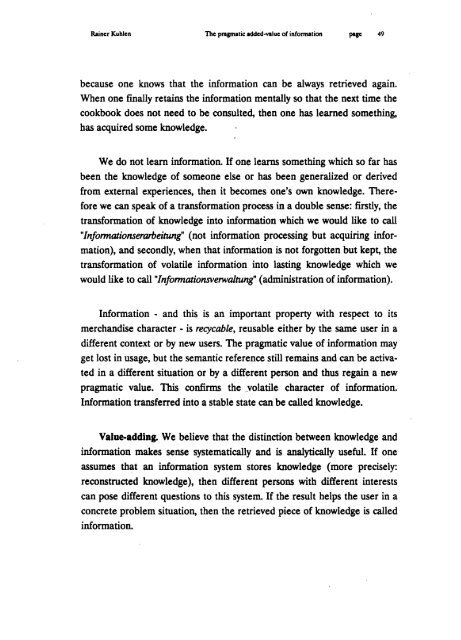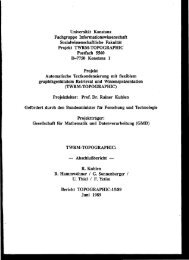Vorwort - Prof. Dr. Rainer Kuhlen
Vorwort - Prof. Dr. Rainer Kuhlen
Vorwort - Prof. Dr. Rainer Kuhlen
Erfolgreiche ePaper selbst erstellen
Machen Sie aus Ihren PDF Publikationen ein blätterbares Flipbook mit unserer einzigartigen Google optimierten e-Paper Software.
<strong>Rainer</strong> <strong>Kuhlen</strong> The pragmatic ac1ded-value of information page 49<br />
because one knows that the information can be always retrieved again.<br />
When one finally retains the information mentally so that the next time the<br />
cookbook does not need to be consulted, then one has leamed something,<br />
has acquired some knowledge.<br />
We do not leam information. If one leams something which so far has<br />
been the knowledge of someone else or has been generalized or derived<br />
from external experiences, then it becomes one's own knowledge. Therefore<br />
we can speak of a transformation process in a double sense: firstly, the<br />
transformation of knowledge into information which we would like to caU<br />
"Infonnationserarbeitung" (not information processing but acquiring information),<br />
and secondly, when that information is not forgotten but kept, the<br />
transformation of volatile information into lasting knowledge which we<br />
would like to call "Infonnationsverwaltung" (administration of information).<br />
Information - and this is an important property with respeet to its<br />
merchandise character - is recycable, reusable either by the same user in a<br />
different context or by new users. The pragmatic value of information may<br />
get lost in usage, but the semantic reference still remains and can be aetivated<br />
in a different situation or by a different person and thus regain a new<br />
pragmatic value. This confinns thevolatile charaeter of information.<br />
Information transferred into a stable state can be called knowledge.<br />
Value-adding. We believe that the distinetion between knowledge and<br />
information makes sense systematically and is analytically useful. If one<br />
assumes that an information system stores knowledge (more precisely:<br />
reconstrueted knowledge), then different persons with different interests<br />
can pose different questions to this system. If the result helps the user in a<br />
concrete problem situation, then the retrieved piece of knowledge is called<br />
information.




